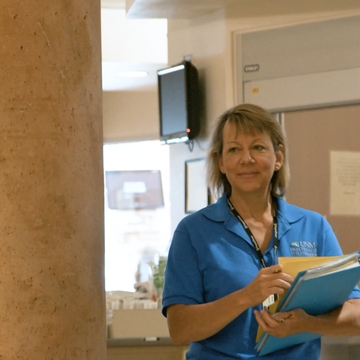Program Provides Research Opportunities for Undergraduate Students

Volunteering Hope
One Woman's Mission to Help Those Touched by Brain Injury
When Nancy Hansen arrived at UNM Hospital in October 2016 to see a friend whose husband was briefly a patient in the Neurosciences Intensive Care Unit, the normally cheerful woman was terrified.
Hansen pulled out a notebook and pen and promptly started jotting down the names of the attending physician, the charge nurse and the bedside nurses. Then she calmly explained to her friend how a teaching hospital functions and what to expect.
The woman's anxiety subsided, and her husband, marveling at the transformation, asked Hansen her secret.
"It's because I know how she feels," Hansen told him. Twenty months earlier, Hansen had been the one keeping an anxious vigil in the Neurosciences ICU for her husband Michael, who had suffered a ruptured brain aneurysm. Sadly, after nearly three days, doctors decided there was nothing more that could be done, and he was removed from life support.
Knowing that she had just helped her friend through a tough time, Hansen had an epiphany. "By the end of the night, I thought, 'I need to design this role. I need to come in here and volunteer and do this.'"
And that is how she came to spend an afternoon each week visiting with patients and their families in her role as the unit's volunteer navigator.
Newly arrived family members are easy to spot, Hansen says. "Their eyes are glazed over and they have this 'Oh my gosh, what just happened to me?' look."
She is quick to reassure them that it is natural to feel disoriented. "That's normal - that's what this does to you when you have a loved one hovering between life and death," she says. "It impacts you in a way that is really truly impossible to describe until you've been through it."
Hansen's journey to bringing a healing presence to the unit began Feb. 11, 2013, the day her 58-year-old husband collapsed while getting ready to head off to his job as an aviation company CEO.
"It was actually the first time I had ever set foot in this hospital," she says. "I probably knew before they did he wasn't going to make it." But in the midst of the tragedy Hansen was deeply moved by the compassion of the nurses and physicians who cared for her husband.
"My husband passed away in this unit - I never left," she says. "I fell in love with the whole team of people. Instead of this being a place where I never wanted to come back because this is where my husband died, it became my home away from home."
Hansen urges families whose loved ones are in intensive care to keep a log of the tests that are run, who ordered them and what results are returned by the lab. "By Day Three you'll have forgotten what happened which day, because it's all blurred together," she says.
Some people are so undone that keeping track of what unfolds from one day to the next might be all that they can manage. For those who are less overwhelmed, Hansen methodically explains the roles of the physicians, nurses and techs who are busy running the unit.
"I remove the confusion - that's the first thing," she says. "I empower them, because I know some of them are afraid to ask questions. I tell them, 'They want you to understand, so it's OK to ask questions.'"
Hansen's devotion to the unit has taken many forms. A few months after her husband's death, she and her two adult daughters decided to use money that had been donated in his name to fund an annual critical care conference at UNMH run by Jon Marinaro, MD, the doctor who had overseen Michael's care.
The conference features presentations on the latest developments in critical care, Hansen says. One speaker discussed the protocols for cardiac surgery advanced life support. "Within two weeks, someone's life was saved because of that procedure," she says (it has since become standard at UNMH). "It was amazing that I got to be this tiny little piece of that."
From her life as a stay-at-home mom before the loss of her husband, Hansen has become an ambassador for the UNMH critical care team, presenting each year at the conference and to the Critical Care Student Association. She earned her associate's degree in communications and is currently working on her bachelor's through Colorado State University.
"I believe God had a ton of plans for me that would not have happened had my husband not passed away," she says. "It was the most devastating event of my life - and I still continue to grieve after five years, because I was married to him my entire adult life - but I see the incredible ability to make an impact."
"Where most people would walk away and never want to engage in a conversation about these things ever again, I am instead using it to impact the next generation of medical students that become doctors, especially in critical care. I'm working with these families that are heartbroken that don't know that they need me."